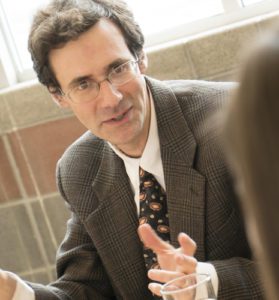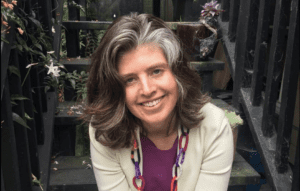Summer Reads: UC Law SF Faculty Share Summer Book Picks
What are UC Law SF faculty members reading this summer and why? Whether for knowledge or for fun, faculty members share their summer book picks below.
Alice Armitage – Professor and Director of Applied Innovation, LexLab
I’m reading Benjamin Labatut’s When We Cease to Understand the World, which piqued my interest with its clever title and back-page description as a book focused on “the complex ties between scientific and mathematical understanding and personal and historical catastrophes.” The book has been described as a “continuously fascinating hybrid work of fiction and history” (Catherine Taylor, Irish Times) and “a dystopian nonfiction novel set not in the future but in the present” (John Banville, The Guardian).
I’m also reading The Cartographers by Peng Shepard, a murder mystery set in the New York Public Library’s department of antique maps. It seems like the characters would be a musty group, but they’re definitely not. This is a fun read.
Hadar Aviram – Professor of Law
Lately, I’ve become interested in the experience of revisiting literature throughout life. Inspired by Ruth Wilson’s The Jane Austen Remedy, in which Wilson discusses the life lessons she has learned from Austen’s novels, I am rereading Arthur Conan Doyle’s entire canon of Sherlock Holmes stories. It’s given me an idea for a book I might write soon.
This summer I’m also volunteering as a lifeguard for San Francisco Recreation and Parks, which has prompted me to read two books by Stuart Holmes Coleman about Hawaii’s great tradition of watermen, lifeguards, swimmers, and surfers: Fierce Heart, about the legendary Keaulana lifeguard family, and Eddie Would Go, about Hawaiian surfing and lifeguarding hero Eddie Aikau.

SLG Director Paul Belonick
Paul Belonick – Assistant Professor of Practice; Director, Startup Legal Garage; and Deputy Director, Center for Innovation
This summer my American historian self is reading Frederick Douglass: Prophet of Freedom by David W. Blight as I ponder our nation’s tortuous path both past and present; as an Ancient historian I’m reading the collected writings of Clement of Alexandria — a second-century theologian and philosopher who endeavored to harmonize Greco-Roman pagan learning and Christianity — to deepen my understanding of these intertwining cultural influences; and as a dad with a two-year-old I’m reading The Whole-Brained Child by Tina Bryson and Daniel Seigel, in an attempt to figure out how to get him to go to bed quietly.

Chancellor and Dean David Faigman
David Faigman – Chancellor and Dean
I’m usually reading at least two books at a time — one non-fiction for daytime reading (when I have time) and one fiction for bedtime reading (when I can make it through a few paragraphs before nodding off). On the non-fiction list, I have Hannah Arendt’s The Origins of Totalitarianism. As a history major in college, I focused on 20th century European history, especially since the Treaty of Versailles. In all my reading of that time, I never sat down to read Arendt’s master work. Given the state of the world today, including the United States, Arendt’s work has continuing relevance.
On the fiction list, I have a soft spot for police/law procedurals, such as those written by Michael Connelly, Daniel Silva, and Lee Child. But no author I’ve come across beats Philip Kerr. Not unrelated to my non-fiction choice, I am now reading Kerr’s The Other Side of Silence. It’s a police procedural set in mid-20th century Germany. It’s beautifully written and immensely entertaining. I highly recommend reading Kerr’s Bernie Gunther series from the start.

Professor Jennifer Oliva
Jennifer Oliva – Professor of Law
This summer, I’m reading two fascinating books that I hope will stretch my thinking about teaching and research. The first is a book by historian Brendan J.J. Payne titled Gin, Jesus, & Jim Crow: Prohibition and the Transformation of Racial and Religious Politics in the South. This book details the history of the American temperance movement and Prohibition in the South from the 1880s to the 1930s through racial and religious lenses. It is a fascinating history at the intersection of drug law and policy, religion, and racial strife in the post-Reconstruction American South.
I am also reading gender studies expert Ellen Samuels’ Fantasies of Identification: Disability, Gender, Race. As famed author of Crip Theory, Robert McRuer, explains, Dr. Samuels “traces the evolution of the ‘fantasy of identification’—the powerful belief that embodied social identities are fixed, verifiable, and visible through modern science. From birthmarks and fingerprints to blood quantum and DNA, she examines how this fantasy has circulated between cultural representations, law, science, and policy to become one of the most powerfully institutionalized ideologies of modern society.” Dr. Samuels does not disappoint!
Aaron Rappaport – Professor of Law

Professor Aaron Rappaport
I have been reading three books this summer. The first is Barbara Walter’s, How Civil War Starts: And How to Stop Them, which is (sadly) very relevant to our current political situation. The second is Zachary Carter’s, The Price of Peace: Money, Democracy, and the Life of John Maynard Keynes, an absolutely fascinating biography of the famous economist (and of the ideological battles over Keynesian economics more broadly). The third is Wendy Wall’s historical work, Inventing the ‘American Way’, which looks at an earlier period in American history (the 1930s and 40s), when various individuals and organizations sought to rebuild a sense of national identity in America.

Professor Dorit Reiss
Dorit Reiss – Professor of Law and the James Edgar Hervey ’50 Chair of Litigation
My non-fiction reading is somewhat eclectic. For example, earlier this summer I read Elie Mystal’s Allow Me to Retort: A Black Guy’s Guide to the Constitution, which is excellent and well written. Though I had a quibble with his First Amendment analysis, I learned a lot and he convinced me that some of his more radical suggestions – like enlarging the Supreme Court to 29 Justices who sit in panels – make sense. Right now I’m reading How to Talk to a Science Denier by Lee McIntyre, which interests me because I interact with many anti-vaccine activists online. I am early in the book, but so far it is very good. It opens with his experiences from a Flat Earth convention, written in an engaging style but also with a lot of good facts and evidence.
I try to balance reading non-fiction with reading fiction. For fiction, I most like fantasy or science fiction, and this summer I’ve been working through Patricia Briggs’ Mercy Thompson series, Sabaa Tahir’s An Ember in the Ashes series, and David Weber’s Safehold series, to name a few favorites.

Professor Reuel Schiller
Reuel Schiller – The Honorable Roger J. Traynor Chair and Professor of Law
This summer, the first three books in the cue are: Gabriel Winant’s The Next Shift: The Fall of Industry and the Rise of Health Care in Rust Belt America (a labor history of Pittsburgh in the second half of the twentieth century that has a lot to tell us about the causes of rising economic inequality in America); Colson Whitehead’s Harlem Shuffle (historical fiction about Harlem in the 1960s by the author of the gut-wrenching books The Nickel Boys and The Underground Railroad); and Philip Tetlock’s Expert Political Judgment: How Good Is It? How Can We Know? (for social science geeks, to be sure, but for years I’ve been meaning to read this book about the psychology of prediction, why even experts are bad at it, and what approaches to data can make people better at it).

Associate Dean for Experiential Learning Gail Silverstein
Gail Silverstein – Associate Dean for Experiential Learning & Clinical Professor of Law
This summer I’m reading two books that focus on important skills of leaders: Tasha Eurich’s Insight and Mary C. Gentile’s Giving Voice to Values. I’m interested in these books in the leadership genre as both an Associate Dean and as a clinical professor. I want to ensure that my leadership skills are effective and honed, and I also want to pass on to my students in my clinical courses how to be effective leaders. Lawyers are leaders even when they don’t have managerial titles, and while the skills of leadership are often called “soft,” we all know they are very challenging. The topics of these two books, namely self-awareness and voicing values, are particularly important at this moment in our history. We are facing numerous social challenges, and we all need increased tools on how to act individually to better serve our collective interests.
 Jessica Vapnek – Lecturer-in-Law, Associate Dean of the MSL Program, and Director of the International Development Law Center
Jessica Vapnek – Lecturer-in-Law, Associate Dean of the MSL Program, and Director of the International Development Law Center
This summer I’m reading two novels and one non-fiction book. The author Bapsi Sidhwa came up in conversation recently, and although I’d read the very powerful Ice-Candy Man (also known as Cracking India), I’d not read anything else of hers. So I’m reading Water, a story of a young (very young) widow. It shows what the cultural practices were like before Gandhi (who makes an appearance in the book) came along. Next, I’m reading Girl, Woman, Other, by Bernardine Evaristo, a drama centering on Black women in the UK. The book won the Booker Prize in 2019. Finally, in the non-fiction category, I’ve just started Salonica, by Mark Mazower. The strapline of the book (if I can borrow that word from journalism) is “City of Ghosts – Christians, Muslims, and Jews, 1430-1510.” I got the book on the recommendation of a Greek friend. I had no idea that Salonica (now Thessaloniki) was a “crossroads metropolis of different religions and ethnicities, where Egyptian merchants, Spanish Jews, Orthodox Greeks, Sufi dervishes and Albanian brigands all rubbed shoulders,” as the back jacket colorfully puts it.

